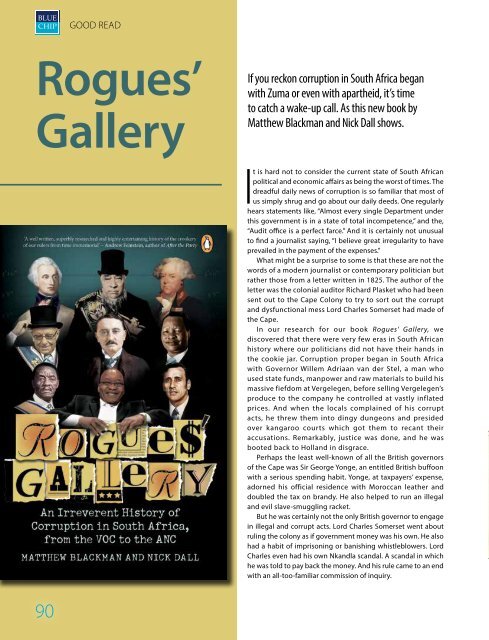Blue Chip Issue 81
Blue Chip is a quarterly journal for the financial planning industry and is the official publication of the Financial Planning Institute of Southern Africa NPC (FPI), effective from the January 2020 edition. Blue Chip publishes contributions from FPI and other leading industry figures, covering all aspects of the financial planning industry. Blue Chip takes this opportunity to wish the FPI a happy 40th anniversary. Congratulations!
Blue Chip is a quarterly journal for the financial planning industry and is the official publication of the Financial Planning Institute of Southern Africa NPC (FPI), effective from the January 2020 edition. Blue Chip publishes contributions from FPI and other leading industry figures, covering all aspects of the financial planning industry.
Blue Chip takes this opportunity to wish the FPI a happy 40th anniversary.
Congratulations!
You also want an ePaper? Increase the reach of your titles
YUMPU automatically turns print PDFs into web optimized ePapers that Google loves.
GOOD READ<br />
Rogues’<br />
Gallery<br />
If you reckon corruption in South Africa began<br />
with Zuma or even with apartheid, it’s time<br />
to catch a wake-up call. As this new book by<br />
Matthew Blackman and Nick Dall shows.<br />
It is hard not to consider the current state of South African<br />
political and economic affairs as being the worst of times. The<br />
dreadful daily news of corruption is so familiar that most of<br />
us simply shrug and go about our daily deeds. One regularly<br />
hears statements like, “Almost every single Department under<br />
this government is in a state of total incompetence,” and the,<br />
“Audit office is a perfect farce.” And it is certainly not unusual<br />
to find a journalist saying, “I believe great irregularity to have<br />
prevailed in the payment of the expenses.”<br />
What might be a surprise to some is that these are not the<br />
words of a modern journalist or contemporary politician but<br />
rather those from a letter written in 1825. The author of the<br />
letter was the colonial auditor Richard Plasket who had been<br />
sent out to the Cape Colony to try to sort out the corrupt<br />
and dysfunctional mess Lord Charles Somerset had made of<br />
the Cape.<br />
In our research for our book Rogues’ Gallery, we<br />
discovered that there were very few eras in South African<br />
history where our politicians did not have their hands in<br />
the cookie jar. Corruption proper began in South Africa<br />
with Governor Willem Adriaan van der Stel, a man who<br />
used state funds, manpower and raw materials to build his<br />
massive fiefdom at Vergelegen, before selling Vergelegen’s<br />
produce to the company he controlled at vastly inflated<br />
prices. And when the locals complained of his corrupt<br />
acts, he threw them into dingy dungeons and presided<br />
over kangaroo courts which got them to recant their<br />
accusations. Remarkably, justice was done, and he was<br />
booted back to Holland in disgrace.<br />
Perhaps the least well-known of all the British governors<br />
of the Cape was Sir George Yonge, an entitled British buffoon<br />
with a serious spending habit. Yonge, at taxpayers’ expense,<br />
adorned his official residence with Moroccan leather and<br />
doubled the tax on brandy. He also helped to run an illegal<br />
and evil slave-smuggling racket.<br />
But he was certainly not the only British governor to engage<br />
in illegal and corrupt acts. Lord Charles Somerset went about<br />
ruling the colony as if government money was his own. He also<br />
had a habit of imprisoning or banishing whistleblowers. Lord<br />
Charles even had his own Nkandla scandal. A scandal in which<br />
he was told to pay back the money. And his rule came to an end<br />
with an all-too-familiar commission of inquiry.<br />
90


















